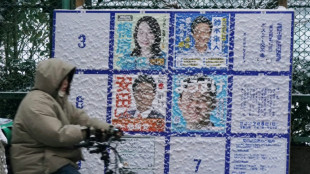

Japan-China spat over Taiwan comments sinks tourism stocks
Japanese tourism and retail shares dived on Monday after China warned its citizens to avoid the tourist hotspot in a spat over Prime Minister Sanae Takaichi's comments on Taiwan.
Takaichi, seen as a China hawk, suggested this month that close US ally Japan could intervene militarily in any attack on the self-ruled island, which Beijing claims.
Asia's two top economies are closely entwined, with China the biggest source of tourists going to Japan -- almost 7.5 million in the first nine months of 2025.
Drawn by a weak yen making shopping cheaper, they splashed out 590 billion yen ($3.8 billion) in the third quarter -- 28 percent of all spending by foreign tourists, transport ministry data shows.
Japan was also the fourth-most popular destination for Chinese tourists last year, helping the land of Mount Fuji, sushi and geishas set new records for foreign arrivals.
Investors wiped as much as 11.4 percent off Japanese cosmetics firm Shiseido's shares on Monday.
Department store group Takashimaya fell six percent and Pan Pacific, behind discount retail chain and tourist magnet Don Quijote, slid as much as 8.4 percent.
Uniqlo owner Fast Retailing -- which has a major presence in China -- fell by close to six percent.
- Xi talks -
Before taking power last month, Takaichi, an acolyte of ex-premier Shinzo Abe, was a vocal critic of China and its military build-up in the Asia-Pacific.
If a Taiwan emergency entails "battleships and the use of force, then that could constitute a situation threatening the survival (of Japan), any way you slice it," Takaichi, 64, told parliament on November 7.
Under Japan's self-imposed rules, an existential threat is one of the few cases where it can act militarily. Taiwan sits around 100 kilometres (60 miles) from the nearest Japanese island.
The comments came just days after Takaichi met Chinese President Xi Jinping for an apparently cordial first meeting on the sidelines of an APEC summit.
Takaichi, who has visited Taiwan and called for closer security cooperation, also met separately with Taipei's representative at the summit.
Her recent comments have sparked a furore, with a Chinese diplomat stationed in Japan threatening to "cut off that dirty neck", apparently referring to Takaichi.
China and Japan last week summoned each other's ambassadors, with Beijing then advising its citizens to avoid travelling to Japan and warning Chinese students in Japan there were risks to their safety.
Over 100,000 Chinese students were enrolled in educational institutions in Japan last year, according to the Japanese government.
Japan's Chief Cabinet Secretary Minoru Kihara told reporters on Monday that the announcement was "incompatible with the broader direction agreed upon by the leaders of the two nations".
On Sunday, Chinese coast guard vessels spent several hours in Japan's territorial waters around the disputed Senkaku Islands, known as the Diaoyu in China, Kihara said.
Beijing insists Taiwan, which Japan occupied for decades until 1945, is part of its territory.
Japanese media reports said that the top official in the foreign ministry for Asia-Pacific affairs headed to China on Monday.
Masaaki Kanai was due to hold talks with his Chinese counterpart Liu Jinsong, the reports said.
- Economic hit -
The diplomatic spat could spell further bad news for Japan's economy, which shrank by 0.4 percent in the third quarter, official data showed on Monday.
Marcel Thieliant at Capital Economics warned that the tensions risked escalating "into a full-blown trade spat" similar to a previous episode in the early 2010s.
This could include China restricting exports of rare earths or imposing restrictions on Japanese exports.
"Carmakers look particularly vulnerable as they are already under enormous pressure from the ascent of Chinese electric vehicle manufacturers," Thieliant added.
O.Blanchard--PP






